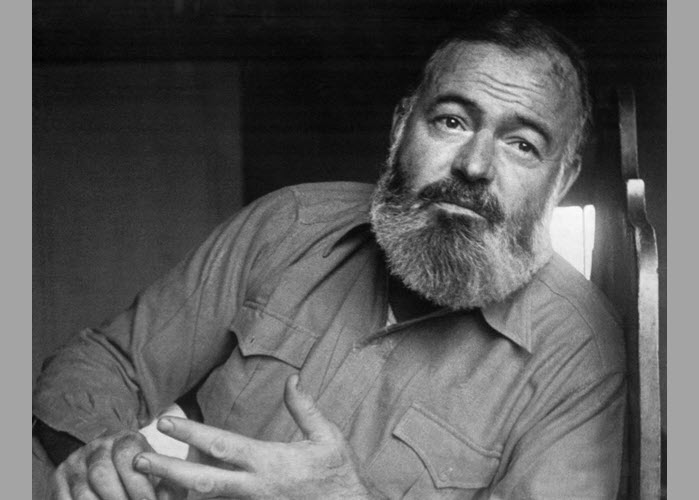Celebrating the Life and Work of Ernest Hemingway

Ernest Hemingway (21 July 1899 – 2 July 1961) was an American novelist, short-story writer, and journalist. He received the Nobel Prize in Literature in 1954.
Early Life And Education
Ernest Hemingway, an iconic American novelist and short-story writer, was born on July 21, 1899, in Cicero (now Oak Park), Illinois. He was the first son of Clarence Edmonds Hemingway, a physician, and Grace Hall Hemingway. The young Hemingway spent his summers at Walloon Lake in Michigan, which became a significant part of his boyhood and later influenced his writing. After graduating from high school in 1917, Hemingway did not pursue college but instead started working as a reporter for The Kansas City Star. His journalistic career taught him the concise writing style that would become his trademark. Hemingway’s early years were marked by a mix of suburban education and outdoor adventures in Michigan, shaping both his character and his future literary voice.
Career And Achievements
Ernest Hemingway, an iconic figure in American literature, began his illustrious career as a writer at the young age of 17, working for a newspaper office in Kansas City. His experiences as a volunteer ambulance driver in World War I and as a journalist covering significant events such as the Spanish Civil War and World War II profoundly influenced his writing. Hemingway’s concise and lucid prose style revolutionized 20th-century fiction, and his works often explored themes of love, war, wilderness, and loss. Among his most famous works are “The Sun Also Rises,” “A Farewell to Arms,” and “The Old Man and the Sea,” the latter earning him the Pulitzer Prize in 1953. The following year, he was awarded the Nobel Prize in Literature for his mastery of narrative, which was most recently demonstrated in “The Old Man and the Sea,” and for the influence he exerted on contemporary style. Hemingway’s legacy continues to endure, with his writings becoming classics of American literature and his life and work still widely studied and celebrated today. His contributions to literature were recognized posthumously, with several of his novels, short-story collections, and non-fiction works published after his death.
Notable Events And Milestones
Ernest Hemingway stint as a reporter for the Kansas City Star introduced him to the terse style that would become his trademark. Hemingway’s participation in World War I as an ambulance driver and his subsequent injury at Fossalta di Piave introduced themes of heroism and human frailty that permeated his novels. Hemingway’s adventurous life, including his experiences in the Spanish Civil War and World War II, provided rich material for his stories. His writing style, characterized by economy and understatement, revolutionized American prose, influencing countless writers and earning him the Nobel Prize for Literature in 1954. Hemingway’s works, such as “The Old Man and the Sea,” “A Farewell to Arms,” and “For Whom the Bell Tolls,” are considered classics, reflecting on themes of courage, loss, and endurance.
His personal life, marked by four marriages and a struggle with depression, added a layer of complexity to his persona and works. Hemingway’s legacy extends beyond literature; he influenced 20th-century fiction and journalism, shaping the modern figure of the disillusioned anti-hero and the telegraphic prose style that still resonates today. His contributions to culture include a blurring of the lines between fiction and journalism, a style that has been emulated by writers and journalists alike. Hemingway’s impact on history is multifaceted. He was a witness to and participant in significant historical events, and his journalistic work, including coverage of the Spanish Civil War and World War II, provided a vivid chronicle of his times. His literary achievements have inspired generations of writers and readers, and his life story continues to captivate the imagination of the public. Hemingway’s exploration of universal themes has made his work enduringly relevant, offering insights into the human condition that transcend time and place.
Awards And Honors
- Nobel Prize in Literature (1954): Awarded for his mastery of the art of narrative, most recently demonstrated in “The Old Man and the Sea,” and for the influence he exerted on contemporary style.
- Pulitzer Prize for Fiction (1953): For “The Old Man and the Sea.”
- Silver Medal of Military Valor (c. WWI): From the Italian Armed Forces for his service during World War I.
- Bronze Star Medal (1947): From the United States Armed Forces for his role as a war correspondent during World War II.
- American Academy of Arts and Letters Award of Merit (1954): Recognizing his contribution to literature.
- Top Reporter of the Last Hundred Years (1999): Posthumously awarded by the Kansas City Star.
Additional Resources
Books About Ernest Hemingway:
- “Hemingway: A Life Without Consequences” by James R. Mellow
- “Hemingway’s Boat: Everything He Loved in Life, and Lost” by Paul Hendrickson
- “The Hemingway Women” by Bernice Kert
- “Papa Hemingway: A Personal Memoir” by A.E. Hotchner
- “Hemingway in Love: His Own Story” by A.E. Hotchner
Documentaries:
- “Hemingway” by Ken Burns and Lynn Novick, available on PBS
- “Hemingway: Wrestling with Life” available on A&E Biography Channel
- “Running from Crazy” featuring Mariel Hemingway, exploring the family history of mental illness
Museums:
- The Ernest Hemingway Home and Museum in Key West, Florida, which offers a glimpse into Hemingway’s life and times
- Finca Vigía, Hemingway’s residence in Cuba, now a museum preserving his work and belongings
These resources provide a comprehensive look into the life and works of Ernest Hemingway, offering various perspectives on his literary contributions and personal history.
Observer Voice is the one stop site for National, International news, Sports, Editor’s Choice, Art/culture contents, Quotes and much more. We also cover historical contents. Historical contents includes World History, Indian History, and what happened today. The website also covers Entertainment across the India and World.
Follow Us on Twitter, Instagram, Facebook, & LinkedIn

